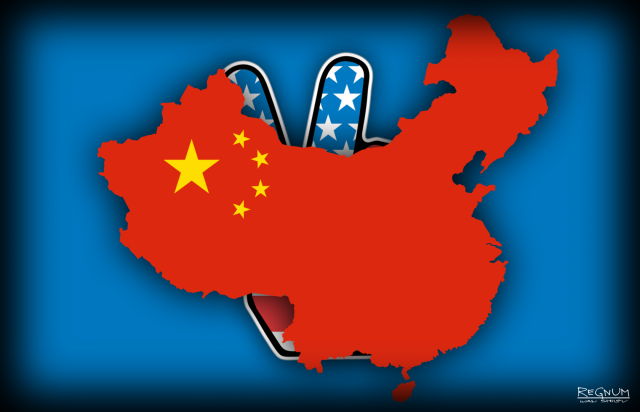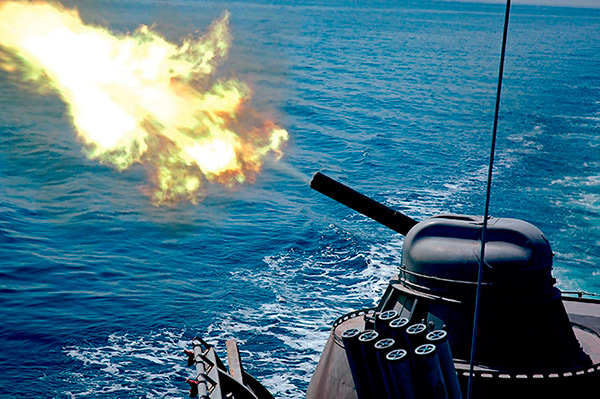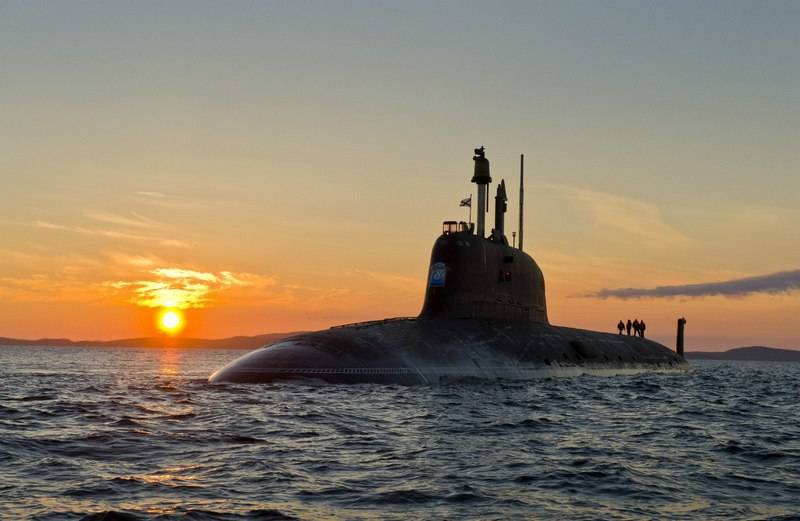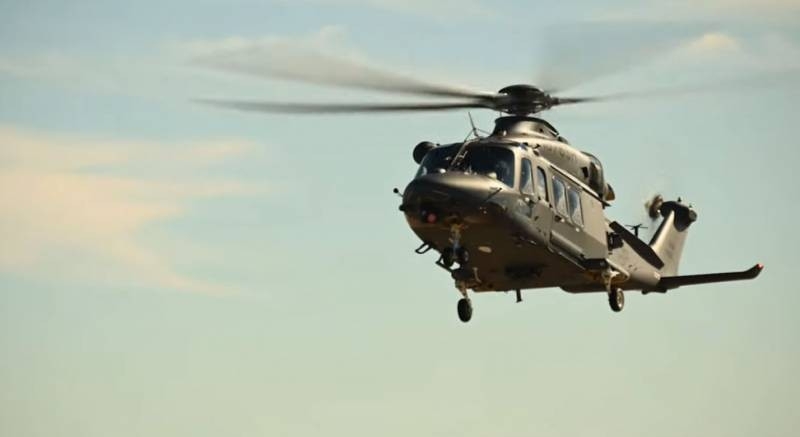
Renowned American neorealist ideologue Christopher Lane has featured prominently in Foreign Affairs, in which he predicted an imminent military confrontation between the United States and China. Material, written in the form of a critique of American policy towards China, nevertheless, it is not devoid of cliches and bias that are usual for overseas analysts, which are due to both the purely Western mentality of the author, and around his political views.
First of all, it should be noted the peculiar nature of the symbiosis of Lane and the media, in which the material is published. Lane is a professor, Head at the University of Texas A&M im. George W. Bush Department of National Security and Intelligence, that is a person, not alien to special services. Foreign Affairs is the official mouthpiece of the Council on Foreign Relations (CFR), influential NGO, which includes the "cream" of the American elite, as well as representatives of the expert community. The magazine has been known for its fierce opposition to the current White House administration in recent years., which tone was set on the eve of the election by CFR President Richard Haas, former head of the political planning department of the State Department. In the previous, in the September issue, he published an article, containing a list of risks for the United States, related to the possible re-election of Donald Trump. Hence follows, as Lane's article, staying in the general trend of publishing CFR materials, despite the appearance of an objectivist foreign policy analysis, addressed primarily to the domestic consumer. One day left before the elections, and in this way the CFR hopes to influence the outcome of the vote. Lane himself remains a supporter of American domination., but as an adherent of the realistic school, unlike liberal idealists, views it through the lens of non-moral leadership, justifying "American exceptionalism", but some global balance. In fact, simulacrum of multipolarity, in which the United States does not impose its will on others by force or by the method of rough pressure, but manage global processes by exploiting the contradictions of their competitors, how the British Empire did it in the 19th century. For examples of, what does this mean, and why, according to realists, Washington should strive in foreign policy, no need to go far. Suffice it to recall the recent revelations of the patriarch of the realist school Henry Kissinger, who called on the US to "make friends" against China with Russia, repeated the maneuver, which the Americans took in the last quarter of the 20th century, playing the "Chinese card" against the USSR.
Through the prism of this conclusion it follows, in our opinion, view Lane's article; seeking to prevent the United States from sliding into military confrontation with the PRC, he, like the rest of the realists of the Kissinger Spill, latently promotes the idea of, that with China "it would be nice" to push Russia. And America from the threat of such a clash - to withdraw, leaving her the role of an interested observer, who "at the right time" will turn into a "global arbiter", dictating to the weakened parties his will regarding the subsequent world order. Now the points about, what Lane writes.
Proclaiming the absence of military conflicts between major powers after 1945 years "amazing", he emphasizes, what does this not mean, that they will not be in the future; the threat of war lies in the persistence of tensions between the US and China, who move by confrontation, and if nothing changes, doomed to collide.
The illusion of the absence of such a threat in the United States is fueled by two factors - the economic interdependence of Washington and Beijing and the destructiveness of a nuclear war., questioning the survival of humanity in it; This does not take into account, that minimizing the power of charges and increasing the accuracy of their delivery vehicles return the current agenda to the prospect of a "limited nuclear war" (add, that it was handed over to the archive with the collapse of the USSR).
It is believed, that peace on Earth is preserved by the dominance of the liberal model and the global institutions that provide it, so, despite the rise in Chinese power, this world order will not be shaken for many decades. but, Lane claims, the world order is changing not only by material factors, but also the dynamics of changes in leading countries, as a result of which the former status quo is losing their support and interest in maintaining it.
The "lessons of history" also speak about the ephemerality of hopes for a long and lasting peace, in particular the experience of the outbreak of the First World War, on the approaches to which the level of mutual dependence of Britain and Germany was higher, than China and the USA now, and generally speaking, than ever and anyone else in history.
So what happened a hundred years ago? Lane notes, what "at the beginning XX century fast economic, the technological and naval growth of the German Empire began to pose a challenge to the then existing world order, based on UK leadership. Despite the close ties between the two countries, the British elite began to view the growing German economic power as a threat. Furthermore, the British condemned this power, which, in their opinion, was based on unfair trade and industrial policies: they claimed, that German prosperity is based on massive state participation, and not on liberal economic laws, operating in England. The British elite had a persistent antipathy towards Germany for another reason.: the British were disgusted by German political culture, with its emphasis on the army, its values as opposed to liberal British norms. Simply put, then in England Germany was considered an incorrigibly bad member of the international community. No wonder, therefore, that immediately after the outbreak of the war, the British gave it the appearance of an ideological "crusade" of liberalism against Prussian autocracy and militarism ".
Besides, Lane points out, “The British and the Germans vied with each other for international prestige and power. German Weltpolitik, in which the building of a large fleet and the acquisition of colonies took center stage, provoked Britain - this trading nation with a huge colonial empire. The British could not survive the emergence of a rival naval power right next to them - in the North Sea. Actually, the ambitious German program to create a powerful navy was spurred not so much by economic or military considerations, how much the desire to gain prestige. At the same time, Germany's goals were not only, to challenge Britain, and in that, to assert your status as an equal force ".
And this is where Lane comes to, what is today called the "trap of Thucydides": “Despite such powerful motives for the conflict, the war itself in August 1914 the year between Britain and Germany was not at all inevitable. ... There was no dispute between the parties over territories, thrones or boundaries. ... So why did Germany and England go to war with each other?? The answer is, that a military conflict, usually, this clash of the dominant state, who feels the loss of their power, and a rapidly growing rival ".
“Parallels Between British-German Antagonism Before the War 1914 years and the current US-China confrontation may seem astonishing, although they require certain caution, - the author continues. — Britain's failure to peacefully adjust to the realities of German growth contributed to the outbreak of World War I.. from Togo, whether the US will follow that British precedent or not, will depend on, Will the current US-China rivalry end in war or not?.
Lane sees the prerequisites for a possible military clash between the United States and China primarily in the ideologization of the confrontation, responsibility for which he assigns to Secretary of State Mike Pompeo, who gave a speech in July, in which he urged not to forget the "Marxist-Leninist origin of the CPC ideology". And with this he summed up the base for "a more acute confrontation with China". The second premise is non-recognition by Washington and Beijing, unlike Washington and Moscow during the Cold War, spheres of influence each other, the boundaries of which indicate the "red line", and it is not allowed to cross. And since here they still intersect - in the South China and East China Seas, acquiring special acuteness around Taiwan - the political scientist gives the American leadership a recommendation, which he is not sure, what will they hear: “The United States can be advised to remove the ideological component from relations with China altogether and treat them as a traditional rivalry between two superpowers., in which diplomacy restrains the excessive severity of confrontation through compromises, reconciliation and the search for common ground. If your opponent is evil, then a compromise with him is impossible, and negotiations turn into connivance of vice. ... Washington challenges the long-recognized status quo around Taiwan, moving towards recognizing it independence, openly declaring their military obligations to protect it ".
Again: the article and the forecast set out in it are controversial due to the unknown result of the elections. It is assumed, that already 4 November may come baboutmore certainty about the prospects. But on condition, that the winner will be clear, the loser will agree with this and admit defeat, and in the case, if not admit, everything will be limited to a local recount of votes, how in 2000 year, or litigation. And will not lead to a large-scale internal political confrontation, serving as a detonator for unpredictable confrontation, already internal, civil.
But even if we assume, that nothing will change, and the trends outlined in Lane's material will remain unchanged after the elections, the military conflict between the United States and China is still not predetermined. And not inevitable, although the US is really unlikely to give up provocations in the South China Sea and around Taiwan. Why? The article has a very specific, exhaustively described, but analytically underestimated plot. There he is: "RAND Corporation think tank study" Scoring in the US-China Competition "back in 2015 the year indicated, that the military power gap between the United States and China in East Asia is rapidly closing. The US Navy and military bases in this part of the world are under growing threat from China. ".
It's true, but not all. The whole truth is, Oh really, only American military bases in the Asia-Pacific region are under threat of a retaliatory Chinese strike. But this in no way applies to the continental territory of the United States itself., separated from China by the Pacific Ocean. Strategic potential, which forms the basis of the nuclear power of the United States and Russia, not decisive in China, where priority is given to the deployment of INF systems, which are defensive. But let's agree: this is not an equal threat, it does not balance such threats. The forward contingents of the armed forces are one thing, put forward thousands of kilometers from their own borders and in fact are an instrument of aggression; completely different - the territory of the metropolis with the population living on it, economy and infrastructure. Due to the internal projection of the material, Lane's analysis is not considered, that with the continuation of the aggressive preparations by the American side, in particular, when fulfilling the promise to deploy its own RIAC in the APR, aimed at China and Russia, Beijing has the right to change the priority system. And focus on building up already strategic nuclear forces, if not to parity, the, at least, within the framework of reasonable sufficiency for such potential damage to the metropolis, which the USA will find unacceptable. Technologically it is not difficult, especially considering the very likely military-technical assistance from the Russian side.
This is from a military point of view. And with the political defense reserve of the Celestial Empire, further military rapprochement with Russia remains, which already has such a strategic deterrent potential. So the mentioned "trap of Thucydides" in this case does not fully describe the current plot.. The principle of the "global triangle" is much more adequate (Washington - Beijing - Moscow), in which the one invariably loses, against which the two have united. And if, in a relative world, it will take many years to prove this equation again, maybe decades, the potential consequences of a military conflict, at least from a material point of view, quite amenable to calculations. And they are able to sober up even the most adventurous, a head clouded with ambition. Finally, no matter how much the Pentagon strategists considered the probable losses of the United States in a "limited" nuclear war in the 1980s, each time they reached a figure that was unacceptable to them, plus or minus 30 millions.
Will come out this time. With the same consequences for your militaristic plans. AND, realizing their impracticability, will begin to rock the PRC from the inside. properly, have already started, what the State Department attack mentioned by Lane says, and then the White House on the PDA. It means, what, learning the lessons of the collapse of the USSR, our two countries, holding each other, we should boldly transfer the inevitable confrontation with the United States from the "sprint" format to the "stayer". For historical time today is working against Washington. It is not excluded, that understanding this is what prompts American intellectuals to spread such apocalyptic scenarios.
Vladimir Pavlenko











